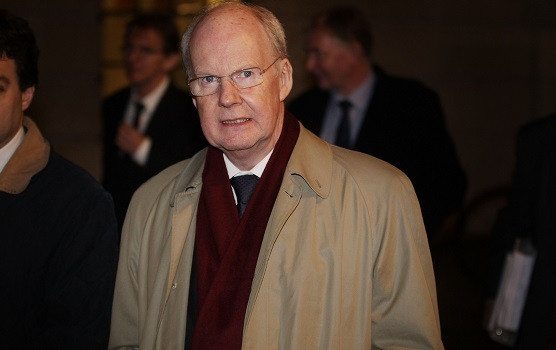Who is Murdoch MacLennan? Fleet Street giant Peter Oborne blames for 'destroying' the Daily Telegraph

Peter Oborne, former chief political correspondent at the Daily Telegraph, hasn't exactly held his tongue over who he blames for paper's alleged "collapse" in standards and "soft" coverage of HSBC's tax affairs.
Oborne quit the Telegraph over what he described as a "form of fraud" after accusing the paper of refusing to cover negative stories about the banking giant - and lucrative advertiser - because of the commercial implications.
Not content so much with burning bridges at the Telegraph as effectively throwing a grenade into their offices by publishing the reasons why he quit, Oborne used the publicity surrounding his resignation to take several more parting shots at one man in particular – Telegraph Media Group chief executive Murdoch MacLennan.
"The Telegraph needs to explain to us why its coverage of HSBC has been skewed, and the really important people who it should explain this to are the readers of the Daily Telegraph," Oborne told Channel 4 News.
He added: "I've had so many conversations with Telegraph staff. I believe I am speaking for the vast majority of Telegraph staff that we have no confidence in the chief executive Murdoch MacLennan and I'd go further than that and say we have no confidence at all in the Barclay brothers who own the paper."
A ruthless operator
According to Oborne, MacLennan was the one person at the Telegraph "determined" not to allow negative stories about HSBC to appear in the paper.
Oborne said in his letter that MacLennan would "express concern about headlines even on minor stories", according to one former Telegraph journalist.
He added it was MacLennan's decision to allow advertising to affect editorial, describing how he was "unapologetic" about it.
MacLennan, a former Associated Newspapers managing director, joined the Telegraph group in 2004 after its acquisition by the secretive Barclay twins. The destiny of the UK's best-selling quality newspaper had been handed to one of Fleet Street's most talented and ruthless operators.
With the paper's circulation falling, MacLennan made the decision in 2010 that the future of the British press was digital.
From a business perspective, this conclusion worked. The new direction included introducing a metered paywall for UK users in 2013. Last year, Telegraph Media Group reported pre-tax profits of £57m, partly due to a saving on newsprint and distribution and an increase in digital operations and investment.
However, this came at a cost, according to Osborne. Soon a "wave of sackings" occurred at the paper, including around 80 mostly print-based editorial positions as the focus switched to digital. These lay-offs included the "dismaying" departure of editor Tony Gallagher. His position was replaced by a new head of content, American Jason Seiken.
Oborne said:
The arrival of Mr Seiken coincided with the arrival of the click culture. Stories seemed no longer judged by their importance, accuracy or appeal to those who actually bought the paper. The more important measure appeared to be the number of online visits. On 22 September Telegraph online ran a story about a woman with three breasts. One despairing executive told me that it was known this was false even before the story was published. I have no doubt it was published in order to generate online traffic, at which it may have succeeded. I am not saying that online traffic is unimportant, but over the long term, however, such episodes inflict incalculable damage on the reputation of the paper.
Referring to the first time he voiced his concerns in 2012, Oborne said: "A little while later I met Mr MacLennan by chance in the queue of mourners outside Margaret Thatcher's funeral and once again urged him not to take Telegraph readers for granted. He replied: 'You don't know what you are f*****g talking about.'"
Ascent to the top
Away from Oborne (and possible others at the Telegraph), MacLennan is seen as one of the most influential and powerful figures in British media.
Beginning life as a trainee reporter at the Scotsman, MacLennan, now 66, rose up to become production director of the Daily Record and Sunday Mail in 1982. Two years later he became the technical director of the paper's publisher, Mirror Group Newspapers.

MacLennan moved across several director positions over the following few years, including roles at the Express and as managing director of the Daily Record and Sunday Mail until he was hired as managing director of Associated Newspapers in 1994. The publisher, now known as DMG Media, is responsible for some of the biggest media brands in the UK such as the Daily Mail, Mail Online and Metro.
In 2010, MacLennan was brought in as chief executive for the Telegraph media and straight away began his "ruthless transformation" of the group.
In the same year, he was ranked number 17 on the annual MediaGuardian 100 list of most powerful people in the UK.
Despite his ranking on the top 100 list slipping to 39 in 2014, MacLennan's influence could extend even further than his own papers following his appointment to the board of the Regulatory Funding Company, the group responsible for funding the new press regulator the Independent Press Standards Organisation (Ispo).
© Copyright IBTimes 2025. All rights reserved.






















